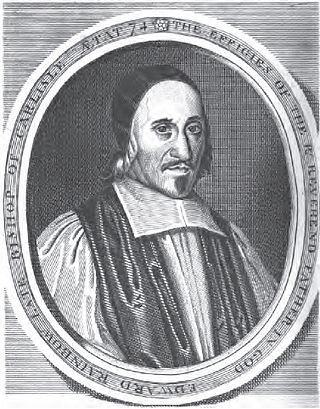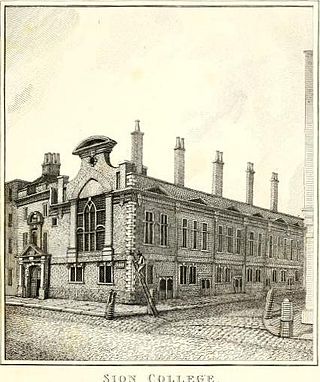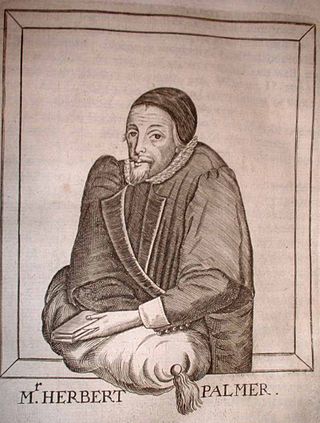Related Research Articles

John Hacket was an English churchman, Bishop of Lichfield and Coventry from 1661 until his death.
The Regius Professorships of Divinity are amongst the oldest professorships at the University of Oxford and the University of Cambridge. A third chair existed for a period at Trinity College Dublin.

Edward Rainbowe or Rainbow (1608–1684) was an English academic, Church of England clergyman and a noted preacher. He was Master of Magdalene College, Cambridge, Vice-Chancellor of the University of Cambridge and Bishop of Carlisle.

Sion College, in London, is an institution founded by royal charter in 1630 as a college, guild of parochial clergy and almshouse, under the 1623 will of Thomas White, vicar of St Dunstan's in the West.

Herbert Palmer (1601–1647) was an English Puritan clergyman, member of the Westminster Assembly, and President of Queens' College, Cambridge. He is now remembered for his work on the Westminster Shorter Catechism, and as a leading opponent of John Milton's divorce tracts.
Thomas Horton D.D. was an English clergyman, Professor of Divinity at Gresham College in London, and President of Queens' College, Cambridge.
Richard Mayo (Mayow) (1631?-1695) was an English nonconformist minister who after ejection in 1662 from his living ran a separatist congregation. He was the biographer of Edmund Staunton.
Edmund Staunton (Stanton) (1600–1671) was an English clergyman, chosen by Parliament as President of Corpus Christi College, Oxford, and a member of the Westminster Assembly. Later he was a nonconformist minister.

William Jenkyn (1613–1685) was an English clergyman, imprisoned during the Interregnum for his part in the 'Presbyterian plot' of Christopher Love, ejected minister in 1662, and imprisoned at the end of his life for nonconformity.

John May (Meye) was an English academic and churchman, who became Bishop of Carlisle. He also served the House of De Vere as cleric in Buckinghamshire.
Thomas Westfield was an English churchman, Bishop of Bristol and member of the Westminster Assembly.
Robert Mapletoft was an English churchman and academic, Master of Pembroke College, Cambridge and Dean of Ely.
Edmund Boldero (1608–1679) was an English royalist clergyman and academic, Master of Jesus College, Cambridge from 1663.
Hugh Weston was an English churchman and academic, Dean of Westminster and Dean of Windsor, and Rector of Lincoln College, Oxford.
Thomas Fowle was a Church of England clergyman, Fellow of St John's College, Cambridge, rector of Redgrave and Hinderclay, Suffolk, and prebendary of Norwich Cathedral.
Samuel Fairclough (1594–1677) was an English nonconformist divine.

Simon Haynes or Heynes was Dean of Exeter, Ambassador to France, and a signatory of the decree that invalidated the marriage of Henry VIII with Anne of Cleves. He became President of Queens' College at the University of Cambridge from 1529 to 1537, and toward the end of his life, was installed Canon of Windsor at Windsor Castle.
John Pory (1502/03–1570) was an English churchman and academic, Master of Corpus Christi College, Cambridge.
Edward Hawford D.D. was an English churchman and academic, Master of Christ's College, Cambridge from 1559. While Hawford was a somewhat conservative and administrative-minded academic politician head of house, no friend of religious enthusiasm and suspected of covert Catholicism. Christ's became a Puritan centre under his mastership.
William Wells was an English clergyman and academic, who served as President of Queens' College, Cambridge and Archdeacon of Colchester.
References
- ↑ "Martin, Edward (MRTN605E)". A Cambridge Alumni Database. University of Cambridge.
- Attribution
![]() This article incorporates text from a publication now in the public domain : "Martin, Edward". Dictionary of National Biography . London: Smith, Elder & Co. 1885–1900.
This article incorporates text from a publication now in the public domain : "Martin, Edward". Dictionary of National Biography . London: Smith, Elder & Co. 1885–1900.